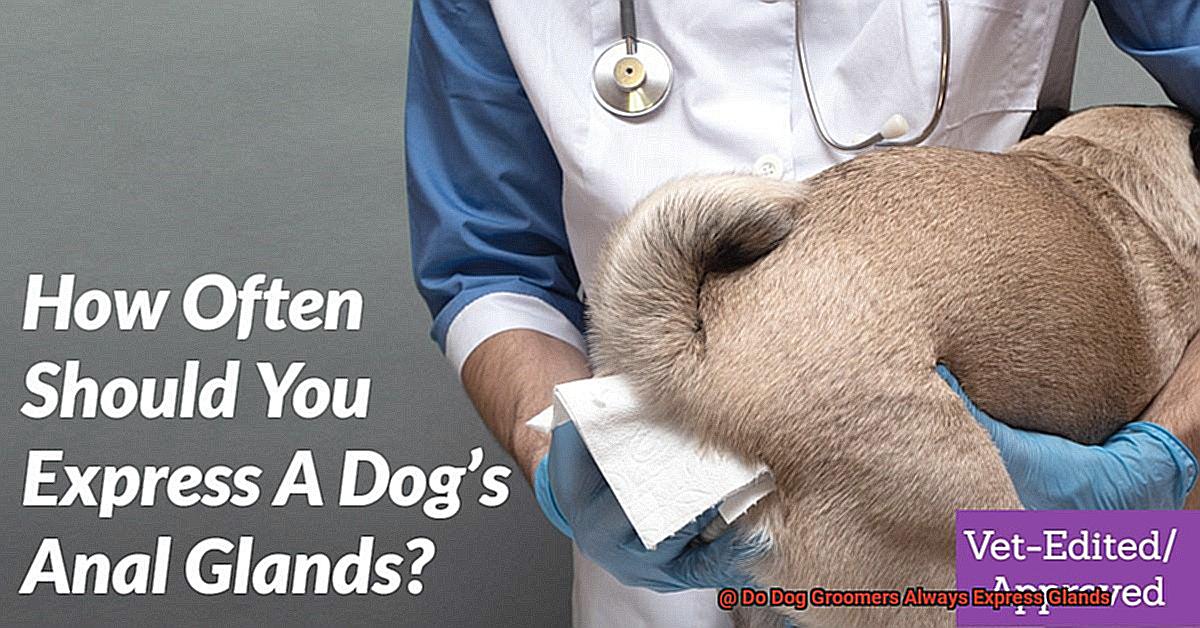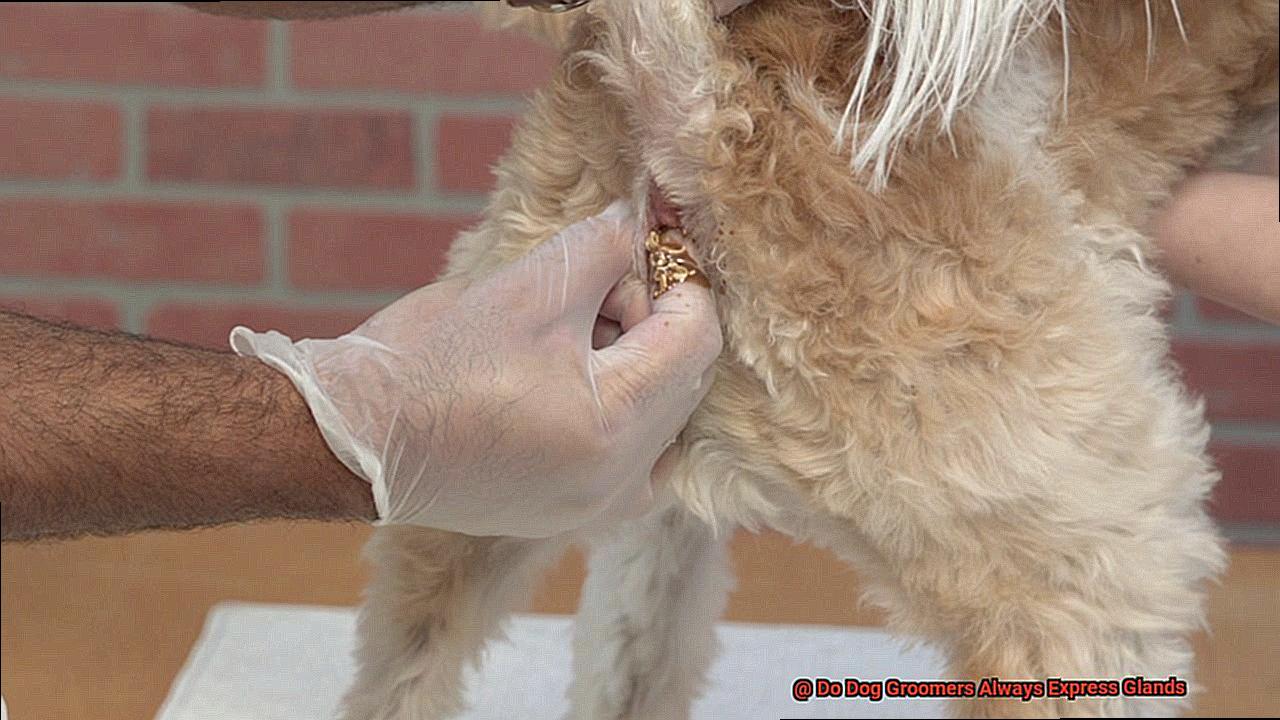Do Dog Groomers Always Express Glands?
Picture this: your furry friend, lounging in the lap of luxury, getting pampered like a superstar. Ah, the joys of dog grooming. But amidst the bubble baths and nail trims, there’s a hot topic that has everyone barking: expressing dog glands. Do groomers always tackle this peculiar task, or is it more of a hit-or-miss situation?
Well, my fellow dog lovers, get ready for a wild ride as we dive into the world of gland expression. We’ll explore the ins and outs, weigh the pros and cons, and discover why every groomer needs to be armed with knowledge about these mysterious glands.
Let’s face it – dogs have some funky little sacs tucked away in their behinds called anal glands. These scent-filled secretory wonders serve as their personal calling cards or even historical markers. While some pups sail through life without any gland issues, others aren’t so lucky and need a skilled groomer to handle their delicate derrière situations.
But before we get too deep into this behind-the-scenes adventure, let’s talk about the good and bad sides of expressing dog glands. On one paw, expressing these glands can bring relief to your furry friend by preventing infections or nasty odors from taking over. However, it’s not all sunshine and rainbows; some dogs find the process uncomfortable and improper expression can lead to more problems down the road.
So why is it crucial for groomers to be gland-expression gurus? Well, having an in-depth understanding of canine anatomy allows them to spot potential complications early on and take action swiftly. Armed with this knowledge, groomers become superheroes who can educate pet parents about warning signs or irregularities that may require a vet visit. Plus, being able to safely and effectively express glands ensures that our four-legged pals stay happy and healthy, earning the trust and loyalty of both pets and their owners.
In conclusion, expressing dog glands remains a hot topic among groomers and pet parents. It has its advantages, but it’s not without risks. With the right expertise and education, groomers become invaluable allies in keeping our furry friends feeling fabulous. So whether you entrust your pup to an eagle-eyed groomer or a seasoned pro, rest assured that they’ve got your dog’s derrière covered.
Do dog groomers always express glands
Contents
- 1 Do dog groomers always express glands
- 2 What are Anal Glands and Why Do They Need to be Expressed?
- 3 When is Expressing Anal Glands Necessary?
- 4 Factors That Influence Whether a Dog Needs Regular Expression of its Glands
- 5 Signs That Indicate the Need for Anal Gland Expression
- 6 Pros and Cons of Expressing Anal Glands
- 7 What Should Dog Owners Know About Expressing Anal Glands?
- 8 How Can Dog Owners Communicate Their Preferences to their Groomers?
- 9 Proper Technique and Hygiene Practices for Expressing Anal Glands
- 10 Conclusion
In this article, we’ll explore the factors that go into a groomer’s decision to express a dog’s glands, specifically focusing on French Bulldogs. So, grab a cup of coffee, sit back, and let’s dive into the world of anal gland expression.
Understanding Anal Glands:
Before we discuss whether dog groomers always express glands, let’s understand what anal glands are. Anal glands are small sacs located on either side of a dog’s anus, responsible for secreting a scent used for territorial marking. While some dogs naturally empty their glands during bowel movements, others may require assistance in expressing these glands.
Factors Influencing the Decision:
- Breed Anatomy: French Bulldogs, with their short and compact bodies, may be more prone to anal gland issues due to their specific anatomy. This makes regular examination and potential expression important for their comfort and well-being.
- Signs of Discomfort: Groomers carefully observe any signs of discomfort or irritation in the anal area. Excessive licking, scooting on the ground, or a foul smell could indicate a need for expression to relieve discomfort and prevent complications.
- Regular Bowel Movements and Diet: Dogs with regular bowel movements and a balanced diet that promotes firm stool consistency are less likely to experience gland issues. A healthy diet can help prevent anal gland problems in French Bulldogs.
- Individual Needs: Each dog is unique, and some dogs have healthy and functioning glands that do not require regular expression. In such cases, groomers may choose not to express glands unless explicitly requested by the owner or if there are clear indications that expression is necessary.
Communication is Key:
To ensure your French Bulldog receives the appropriate care during grooming, communication with your groomer is crucial. Discuss your dog’s specific needs and any concerns you may have regarding anal gland expression. Your groomer should be knowledgeable about the proper technique and hygiene practices when expressing anal glands.
Conclusion:
In conclusion, dog groomers do not always express glands during grooming sessions. The decision to express anal glands depends on various factors, including breed anatomy, signs of discomfort, regular bowel movements, and individual needs. As a French Bulldog owner, it’s important to communicate openly with your groomer to ensure your furry friend’s comfort and well-being. Remember, a happy French Bulldog is a well-groomed French Bulldog.
What are Anal Glands and Why Do They Need to be Expressed?
French Bulldogs are known for their adorable squishy faces and playful personalities. But as a French Bulldog owner, you may have encountered some not-so-adorable issues related to their anal glands. So, let’s dive into the world of anal glands and why they need to be expressed for the health and comfort of your furry friend.
What are Anal Glands?
Anal glands, also known as anal sacs, are small glands located on either side of a dog’s anus. These glands produce a smelly, oily substance that is used for scent marking and communication with other dogs. It’s their way of saying, “Hey, I’ve been here.”
Why Do They Need to be Expressed?
Normally, the fluid produced by the anal glands is expelled during bowel movements. However, sometimes these glands can become impacted or blocked, leading to discomfort and potential health issues for your French Bulldog.
Here are some reasons why anal glands may need to be expressed:
- Impaction: If the anal glands don’t empty naturally, they can become swollen and impacted. This can cause pain and discomfort for your pup.
- Infection: When the anal glands become blocked, they can become infected. This can lead to inflammation and even abscesses if left untreated.
- Scooting Behavior: Have you ever caught your French Bulldog dragging their bottom across the floor? This scooting behavior is often a sign that their anal glands are bothering them.
- Breed Characteristics: French Bulldogs, with their short or no tails, lack the natural mechanism of emptying their anal glands through tail wagging. This makes them more prone to anal gland issues and in need of regular gland expression.
How is Anal Gland Expression Done?
Expressing the anal glands involves manually squeezing out the contents of the glands. This should be done by a trained professional such as a veterinarian or a dog groomer. Some groomers offer anal gland expression as part of their services, but not all groomers are comfortable or experienced in performing this procedure. It’s crucial to find a reputable groomer who knows how to properly express anal glands.
Prevention is Key
Regular gland expression can help prevent impaction, infection, and discomfort for your French Bulldog. If your furry friend has chronic anal gland issues, your veterinarian may recommend surgical removal of the glands as a last resort.
Remember, not all dogs require regular anal gland expression. Some dogs are able to empty their glands naturally without any issues. Consult with your veterinarian to determine if your French Bulldog requires regular gland expression and to discuss the best course of action for their specific needs.
When is Expressing Anal Glands Necessary?
French Bulldogs are known for their unique appearance and lovable nature. However, these adorable dogs are prone to anal gland problems, which can cause discomfort and even pain. In this article, we will explore when expressing anal glands is necessary for French Bulldogs and how to ensure their overall well-being.
Understanding Anal Glands:
Anal glands are small sacs located on either side of a dog’s anus. They secrete a smelly fluid that helps with marking territory and communication between dogs. In most cases, dogs can naturally empty their anal glands during bowel movements. However, certain breeds, including French Bulldogs, have a higher risk of developing issues with their anal glands.
Signs that Expressing Anal Glands may be Necessary:
- Scooting: If your French Bulldog starts scooting their bottom along the ground, it may indicate that their anal glands are full or impacted.
- Excessive licking or biting: Your dog may show signs of discomfort by excessively licking or biting at the area around their anus.
- Foul odor: A strong and unpleasant odor coming from your dog’s rear end could be a sign of anal gland issues.
- Swelling or redness: Visible swelling or redness around the anus may indicate an infection or inflammation of the anal glands.
The Importance of Regular Grooming:
Regular grooming sessions with a professional groomer can help in identifying and addressing potential anal gland issues in French Bulldogs. Groomers are trained to recognize signs of discomfort or impaction and can express the anal glands if necessary. It is crucial to communicate openly with your groomer about your dog’s specific needs and any concerns you may have regarding their anal glands.
Seeking Veterinary Assistance:
Expressing anal glands should not be attempted at home without proper guidance from a veterinarian or professional groomer. Veterinarians can examine the anal glands for any abnormalities, check for impaction or infection, and provide appropriate treatment if necessary. Regular veterinary check-ups are crucial in monitoring the health of your French Bulldog’s anal glands.
Factors That Influence Whether a Dog Needs Regular Expression of its Glands
Factors That Influence Whether Your French Bulldog Needs Regular Expression of its Anal Glands
Bonjour, French Bulldog owners. We all know how much we adore our furry friends, but did you know that French Bulldogs are more susceptible to anal gland issues compared to other breeds? It’s true. In this article, we will dive into the factors that influence whether your French Bulldog needs regular expression of its anal glands. So, let’s get started.
- Breed: French Bulldogs, being a small and compact breed, have a higher likelihood of experiencing glandular issues. Their petite size and unique body shape can affect the natural emptying of the anal glands. Other small and toy breeds like Chihuahuas and Yorkshire Terriers share this vulnerability too.
- Diet: Qu’est-ce que tu manges, mon ami? The diet of your French Bulldog plays a significant role in the need for regular expression of its anal glands. A low-fiber diet can result in firmer stools, making it harder for the glands to empty naturally during bowel movements. On the contrary, a high-fiber diet with bulkier stools puts more pressure on the glands, promoting their regular emptying.
- Activity Level: Comment ça va, mon chien actif? The activity level of your French Bulldog can also influence the need for regular expression of its anal glands. Dogs with a sedentary lifestyle and less physical exercise may have weaker muscle tone around the anal area. This can lead to poor gland function and a higher chance of blockage or impaction.
- Age: L’âge n’est qu’un nombre. But when it comes to anal gland health, it can make a difference. Puppies have underdeveloped glandular systems and may require assistance in expressing their glands until they mature. Older dogs may experience reduced muscle tone and overall gland function, making regular expression necessary.
- Health Conditions: Les problèmes de santé peuvent causer des soucis. Certain health conditions can contribute to an increased need for regular gland expression in French Bulldogs. Allergies or skin infections can cause excessive itching and scratching, leading to inflammation and irritation of the anal area. This overproduction of glandular secretions calls for frequent expression.
- Stress and Anxiety: Mon ami, are you feeling stressed? Dogs that experience high levels of stress or anxiety may also be more prone to glandular issues. Stress can affect the normal functioning of the glands, resulting in either excessive secretion or inadequate emptying. French Bulldogs with separation anxiety or exposed to stressful situations regularly may be at risk.
To ensure the well-being of your French Bulldog, it’s important to consider these factors when determining whether regular expression of its anal glands is necessary. N’oubliez pas de consulter your veterinarian or a professional dog groomer who can assess your Frenchie’s specific needs and provide appropriate guidance and care.
Signs That Indicate the Need for Anal Gland Expression
We all love our French Bulldogs with their adorable squished faces and playful personalities. But did you know that these lovable pups are more prone to anal gland issues? That’s right, those cute little behinds can sometimes cause some not-so-cute problems. So, how do you know if your French Bulldog needs their anal glands expressed? Let’s dive into the signs to watch out for.
- Scooting or dragging: Have you ever caught your French Bulldog scooting across the floor like they’re doing the butt-shuffle dance? Well, that’s a telltale sign that their anal glands may need attention. This behavior is their way of trying to relieve the discomfort caused by full anal glands.
- Excessive licking: If your French Bulldog has suddenly become obsessed with licking their rear end, it’s time to pay attention. Excessive licking in this area can indicate that their anal glands are full or impacted.
- Foul odor: We all know that dogs don’t always smell like roses, but if you notice an unusual and strong smell coming from your French Bulldog’s rear end, it could be a sign of anal gland problems. The secretion from the glands has a distinct scent, and when they’re full or infected, it can become quite pungent.
- Difficulty defecating: French Bulldogs may struggle with passing stool if their anal glands are full or impacted. You might notice them straining or showing signs of discomfort during bowel movements. If your Frenchie consistently has trouble doing their business, it’s time to consider getting their anal glands checked.
- Swelling or redness: Keep an eye out for any changes in appearance around your French Bulldog’s anus. Swelling or redness could indicate inflammation or infection in the anal glands. Don’t hesitate to consult a veterinarian if you notice any abnormalities.
- Behavioral changes: Anal gland issues can make your French Bulldog feel uncomfortable and irritable. They may become restless, agitated, or show signs of discomfort like excessive biting or licking the affected area. If your Frenchie’s behavior seems off, their anal glands may be to blame.
Remember, not all dogs will display obvious signs of anal gland issues, but it’s always better to be safe than sorry. If you notice any of these signs in your French Bulldog, it’s best to consult with your veterinarian. They can help determine if your pup needs their anal glands expressed and provide the necessary care.
Pros and Cons of Expressing Anal Glands
The glamorous world of anal glands. It’s not the most pleasant topic to discuss, but as responsible French Bulldog owners, it’s essential to understand the pros and cons of expressing these little troublemakers. So, let’s dive in.
Pros: Why Expressing Anal Glands is a Good Idea
- Relieves discomfort: Just like us humans, dogs can experience discomfort when their anal glands become impacted or infected. Expressing these glands helps relieve that pain and itchiness, making your Frenchie feel more comfortable.
- Prevents health issues: Regularly expressing anal glands can prevent more serious health problems down the line. If left untreated, impacted or infected glands can lead to abscesses, cysts, or even ruptures. Yikes. We don’t want that for our furry friends.
- No more butt scooting: You know that embarrassing moment when your Frenchie starts scooting their bottom across the floor? Yeah, not a good look. Expressing anal glands can help eliminate this behavior by getting rid of the underlying issue causing the discomfort.
- Early detection of problems: When groomers are expressing anal glands, they may notice signs of inflammation, infection, or abnormal discharge. This early detection allows for prompt veterinary intervention and treatment, potentially saving your pup from more serious complications.
Cons: What to Consider Before Getting Squeeze Happy
- Potential for injury: While it’s generally safe when performed by a trained groomer, there’s always a risk of injury if not done correctly. Groomers need to be careful to avoid applying excessive pressure or causing trauma to the area around the glands.
- Uncomfortable for your Frenchie: Let’s face it, having someone mess with your rear end is never going to be a pleasant experience. Especially if there’s already an infection or inflammation present. Groomers must handle the procedure with care and minimize any potential distress for your Frenchie.
- To express or not to express: There’s an ongoing debate in the canine world about how frequently anal glands should be expressed. Some experts argue that overexpression can interfere with the natural functioning of the glands, while others believe regular expression is necessary to prevent issues. Chat with your veterinarian to determine what’s best for your Frenchie.
- Infection concerns: If your Frenchie has an infected anal gland, there’s a risk of spreading the infection if proper hygiene protocols aren’t followed. Groomers must maintain a sterile environment and use appropriate disinfectants to prevent any transmission between dogs.
What Should Dog Owners Know About Expressing Anal Glands?
The glamorous world of anal glands – it’s not a topic that often comes up in polite conversation, but as a responsible French Bulldog owner, it’s important to be well-informed about this aspect of your pup’s grooming routine. Let’s dive in and uncover everything you need to know about expressing anal glands for your beloved Frenchie.
What are Anal Glands?
Anal glands, also known as scent glands, are small sacs located on either side of your French Bulldog’s anus. These glands produce a pungent secretion that dogs use for marking their territory and communicating with other canines. While some lucky dogs naturally express their anal glands during bowel movements, others may require a little extra help in keeping these glands in tip-top shape.
Why is Expressing Anal Glands Important?
Regularly expressing your French Bulldog’s anal glands is crucial for their comfort and overall health. If left unexpressed, these glands can become impacted or infected, causing discomfort and even pain for your furry friend. Signs that your Frenchie’s anal glands may need attention include excessive scooting or dragging their bottom along the ground, constant licking or biting of the anal area, and an unpleasant odor wafting from their rear end.
How is it Done?
Expressing anal glands should always be done by a trained professional, such as a groomer or veterinarian. These experts have the knowledge and experience to safely and effectively express the glands without causing harm to your pup. It’s important to note that not all groomers automatically provide this service, so be sure to communicate your preferences with them.
Preventing Anal Gland Issues
While expressing anal glands is an important part of maintaining your French Bulldog’s hygiene, it should not be seen as a substitute for addressing underlying issues that may be causing gland problems. If your Frenchie has chronic anal gland issues, it’s best to consult with your veterinarian to determine the underlying cause and appropriate treatment.
In addition to regular gland expression, there are a few steps you can take to prevent anal gland issues in your French Bulldog. Keeping the area clean and dry can reduce the risk of infection. A high-fiber diet can also promote regular bowel movements, which may help your Frenchie naturally express their anal glands during elimination.
How Can Dog Owners Communicate Their Preferences to their Groomers?
When it comes to grooming our furry friends, communication is key. As a dog owner, it’s important to be able to effectively communicate your preferences to your groomer so that your beloved pup gets the look you desire. In this article, we’ll explore some expert tips and insights on how dog owners, especially French Bulldog owners, can best communicate their grooming preferences to their groomers.
Find a groomer who listens:
The first step in communicating your preferences is finding a groomer who is willing to listen and understand your desires. Look for a groomer who values open communication and is receptive to your input. This will set the foundation for a successful grooming experience.
Make a list of preferences:
Before your grooming appointment, take some time to make a list of your grooming preferences and any specific instructions you have for the groomer. This could include things like the desired length of your Frenchie’s coat, specific areas you want the groomer to pay attention to, or any grooming techniques you prefer. Having a clear list will help ensure that your preferences are communicated effectively.
Bring visual aids:
A picture is worth a thousand words, and this holds true when it comes to communicating grooming preferences. Consider bringing photos or examples of the desired grooming style for reference. Visual aids can make it easier for groomers to understand and replicate the look you want for your French Bulldog.
Communicate clearly during the appointment:
When you arrive at the grooming salon, make sure to clearly communicate your preferences to the groomer. Be specific about what you want and don’t be afraid to ask questions or address any concerns you may have. Clear communication during the appointment will help ensure that both you and the groomer are on the same page.
Listen to professional advice:
While it’s important to communicate your preferences, it’s also essential to be open to the groomer’s professional advice and expertise. Groomers have experience working with different breeds and styles, so they may have valuable insights or suggestions that could enhance your French Bulldog’s grooming experience. Keep an open mind and consider their suggestions.
Provide feedback:
After each grooming session, it’s crucial to provide honest feedback to the groomer. If there were any issues or if the results didn’t meet your expectations, communicate this to the groomer in a respectful and constructive manner. This feedback allows the groomer to make adjustments and improvements for future appointments.
Proper Technique and Hygiene Practices for Expressing Anal Glands
Expressing anal glands is an essential part of maintaining your French Bulldog’s hygiene and preventing discomfort or potential health issues. In this guide, we’ll walk you through the proper technique and hygiene practices for expressing anal glands, ensuring a clean and comfortable experience for both you and your furry friend.
Proper Technique for Expressing Anal Glands:
- Wear gloves: Protect yourself from potential infections or diseases by wearing gloves throughout the process.
- Firm but gentle grip: Keep a steady grip on your French Bulldog’s hindquarters to prevent any sudden movements or discomfort during the procedure.

Hygiene Practices:
- Clean the area: Prior to expressing the anal glands, clean the area around the anus using warm water and a mild, pet-safe cleanser. This removes debris and reduces the risk of infection or irritation.
- Sterilize equipment: Use clean, sterilized gloves and disposable or sterilizable tools like cotton swabs or anal gland expression tools to avoid cross-contamination between dogs.
Proper Positioning of the Dog:
- Comfortable height: Ensure your grooming table is at a convenient height for easy access to your French Bulldog’s anal area.
- Positioning options: You can have your dog lie on its side or stand with its hind legs slightly elevated, whichever is more comfortable and accessible for both of you.
Expressing the Glands:
- Gentle pressure: Apply gentle pressure on either side of the anus using your gloved fingers or an appropriate tool. Direct the pressure towards the 5 o’clock and 7 o’clock positions where the anal gland ducts are located.
- Avoid pain or injury: Apply just enough pressure to release the gland secretions without causing any pain or injury to your French Bulldog.
Post-expression Care:
- Clean the area again: After expressing the anal glands, clean the area once more to ensure all secretions are removed.
- Soothing ointment or spray: Apply a soothing, pet-safe ointment or spray to prevent potential irritation or discomfort.
- Dispose of waste properly: Dispose of any waste materials in a hygienic manner and wash your hands thoroughly.
By following these proper technique and hygiene practices, you can confidently express your French Bulldog’s anal glands, promoting their overall well-being and maintaining their hygiene. Remember, if you’re unsure or uncomfortable performing this procedure yourself, consult a professional groomer or veterinarian for assistance.
VXpIYcWpkBo” >
Conclusion
In conclusion, it is not always necessary for dog groomers to express glands.
While it may be a common practice in some grooming sessions, it ultimately depends on the individual dog’s needs and health. Dog groomers are trained professionals who assess each dog individually and determine whether gland expression is required.
It is important to note that expressing glands should only be done by experienced groomers, as improper technique can lead to discomfort or injury for the dog.




